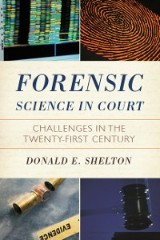Details

Forensic Science in Court
Challenges in the Twenty First CenturyIssues in Crime and Justice
|
36,99 € |
|
| Verlag: | Rowman & Littlefield Publishers |
| Format: | EPUB |
| Veröffentl.: | 16.10.2010 |
| ISBN/EAN: | 9781442201897 |
| Sprache: | englisch |
| Anzahl Seiten: | 196 |
DRM-geschütztes eBook, Sie benötigen z.B. Adobe Digital Editions und eine Adobe ID zum Lesen.
Beschreibungen
<span><span><span>Forensic Science in Court</span><span> explores the legal implications of forensic science—an increasingly important and complex part of the justice system. Judge Donald Shelton provides an accessible overview of the legal aissues, from the history of evidence in court, to "gatekeeper" judges determining what evidence can be allowed, to the "CSI effect" in juries.<br><br>The book describes and evaluates various kinds of evidence, including DNA, fingerprints, handwriting, hair, bite marks, tool marks, firearms and bullets, fire and arson investigation, and bloodstain evidence. Assessing the strengths and limitations of each kind of evidence, the author also discusses how they can contribute to identifying the "who," "how," and "whether" questions that arise in criminal prosecutions.<br><br>Author Donald Shelton draws on the depth of his experiences as courtroom prosecutor, professor, and judge, to provide a well-rounded look at these increasingly critical issues. Case studies throughout help bring the issues to life and show how forensic science has been used, both successfully and not, in real-world situations.</span></span><br><span></span></span>
<span><span><span>Forensic Science in Court</span><span> explores the legal implications of forensic science—an increasingly important and complex part of the legal system. Judge Donald Shelton provides an accessible overview of the legal issues, then examines the strengths and limitations of various kinds of forensic science, including DNA, fingerprints, handwriting, hair, bite marks, tool marks, firearms and bullets, fire and arson investigation, and bloodstain evidence. Case studies illustrate the issues and their application in depth.</span></span><br><span></span></span>
<span><span><span>List of Figures</span></span><br><span><span>Introduction</span></span><br><span><span>Chapter 1: The History and Development of Forensic Scientific Evidence<br>Chapter 2: The Problem of Junk Science<br>Chapter 3: DNA—the New Gold Standard<br>Admissibility of DNA at Trial<br>Postconviction DNA Testing<br>Chapter 4: The "Who" Question<br>Fingerprint Evidence<br>Handwriting Comparison<br>Chapter 5: More "Who" Questions<br>Hair Analysis<br>Bite Mark Analysis<br>Chapter 6: The "How" Question<br>Toolmarks and Firearms<br>Bullet Lead Comparison<br>Fire, Explosion and Arson Evidence<br>Bloodstain Pattern Evidence<br>Chapter 7: The "Whether" Question: Social Science Evidence in Criminal Cases<br>Eyewitness Identification Experts<br>Forensic Abuse Syndromes<br>Conclusions about Social Science Evidence<br>Chapter 8: Jurors and Forensic Science Evidence<br>The "CSI" Myth<br>The "Tech" Effect<br>"Negative" Evidence<br>Voir Dire, Argument and Jury Instructions<br>Chapter 9: Conclusions: Where Do We Go From Here?<br>The Last Twenty Years—An Era of Doubt<br></span><span>Daubert</span><span>'s Change in the Legal Standard for Admissibility<br>The Emergence of DNA as a New Model for Forensic Scientific Evidence<br>The Impact of DNA Exonerations<br>The Impact of the National Academy of Sciences Report<br>The Impact of New Technology Awareness by Jurors<br>The Current State of Forensic Science Evidence in Criminal Cases<br>Thoughts about the Future of Criminal Forensic Science<br>Appendix: Recommendations of the National Research Council Strengthening Forensic Science in the United States: A Path Forward</span></span><br><span><span>Notes</span></span><br><span><span>Index</span></span><br><span><span>About the Authors</span></span><br><span></span></span>
<span><span><span>Donald Shelton</span><span> is Chief Judge of the Michigan 22nd Judicial Circuit and an adjunct professor in the criminal justice and political science departments at Eastern Michigan University. He also serves as a supervising judge for the Washtenaw Juvenile Court. He has previously worked as an attorney and taught at Washtenaw Community College and the University of Maryland.</span></span><br><span></span></span>
<span>
<ul>
<li><span>Analyzes the predisposition of judges to admit evidence seen as scientific</span></li>
</ul></span>
<ul>
<li><span>Analyzes the predisposition of judges to admit evidence seen as scientific</span></li>
</ul></span>

















